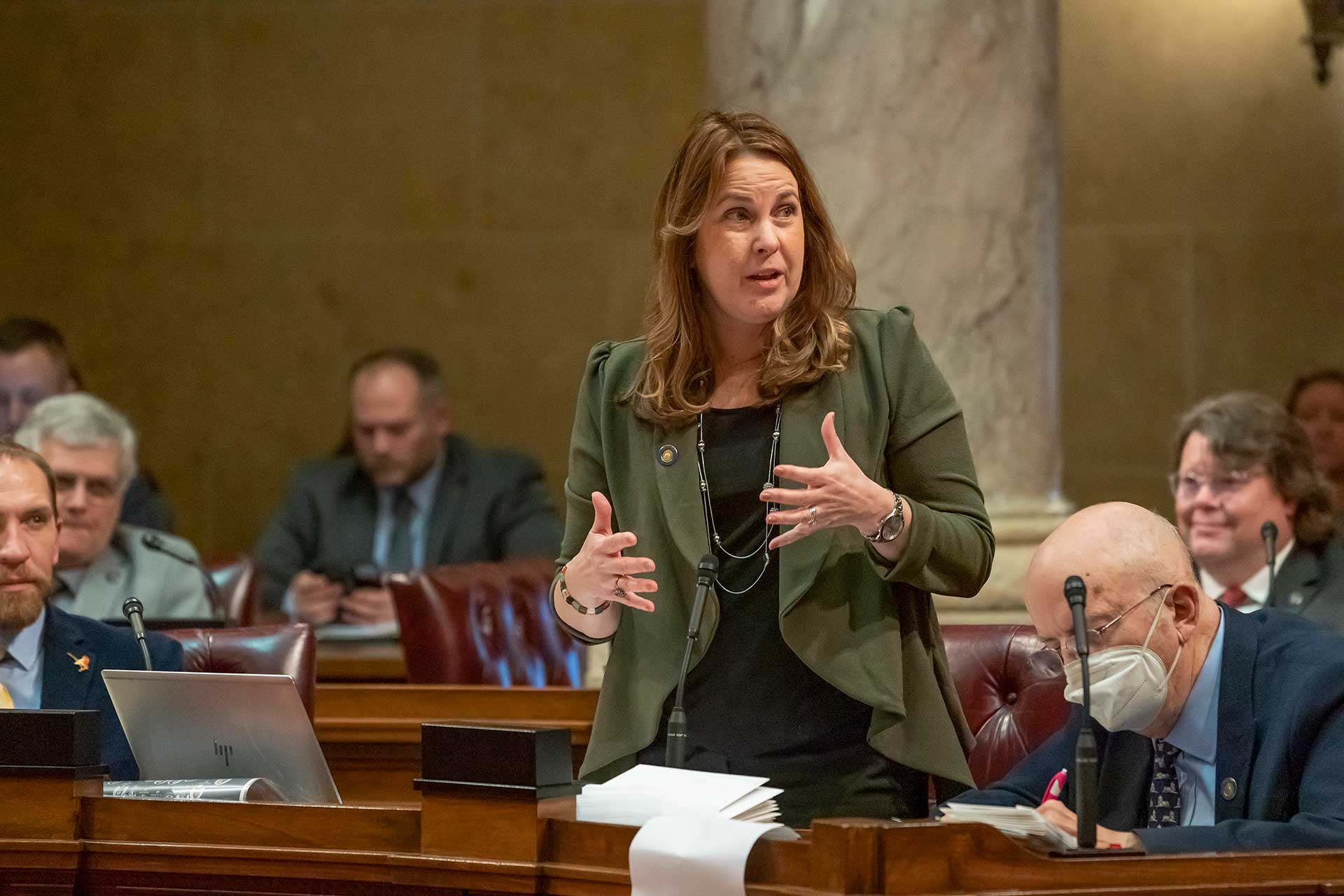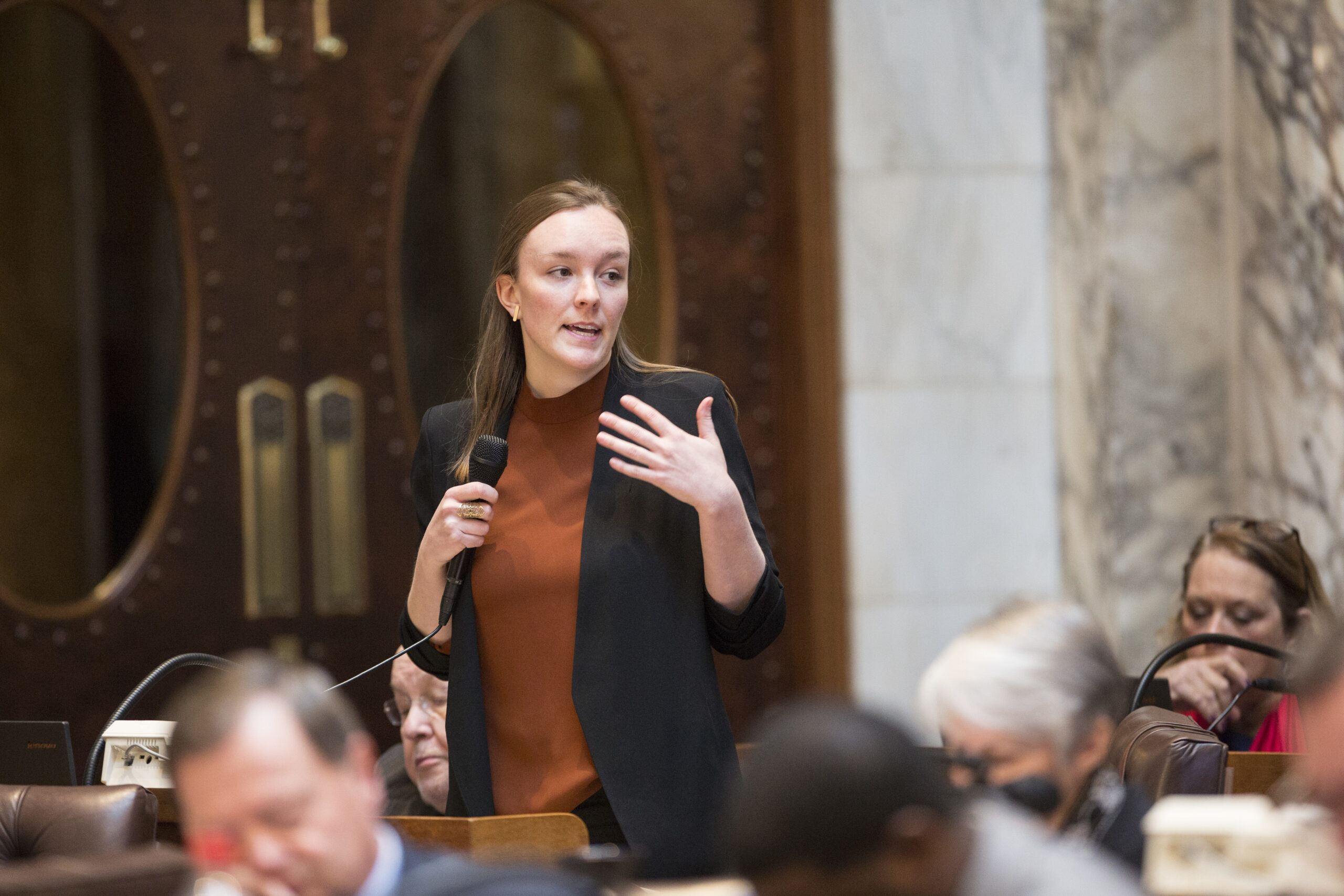It would be easier to hire and fire state employees in Wisconsin under a bill Republican state senators sent to the governor’s desk Wednesday night.
The rewrite of Wisconsin’s century-old civil service system capped a busy day in the Senate that also saw Republicans pass bills to cut funding for Planned Parenthood and expand the use of strip searches in jails.
The flurry of activity also included a measure to end the role of the state treasurer, plans to combat prescription drug addiction and repeat drunken driving, and bills to legalize switchblades and hot pink hunting gear.
Stay informed on the latest news
Sign up for WPR’s email newsletter.
Civil Service
The civil service rewrite would speed up the timelines for hiring and replace the longstanding civil service exam with a more subjective resume-based system. Employees would face longer probationary periods and firing decisions would be based on performance. Disciplinary decisions would also be centralized in the hands of political appointees at the Department of Administration.
When the bill was initially introduced months ago, Republican sponsors and Gov. Scott Walker justified it with anecdotal examples that they said showed it was too hard to fire people for just cause. Some of those examples have since been debunked.
Democratic Sen. Jon Erpenbach of Middleton told Republicans they should leave the current system alone because it protects both workers and taxpayers from political hiring.
“The system right now works, and shame on you for blaming public employees for what you’re about to do,” Erpenbach said.
Appleton Republican Sen. Roger Roth said the real goal was to help agencies make offers to job applicants before they take a job in the private sector instead.
“What I’ve heard time and time again from agency folks is that it takes far too long to hire an employee here in the state,” Roth said.
The civil service bill passed the Assembly months ago, but got hung up in the Senate when Whitewater-area GOP Sen. Steve Nass objected to a provision that would prevent the state from asking about an applicant’s criminal history on initial application forms. Nass said Wednesday that he relented after Assembly GOP leaders told him the bill would die if he tried to amend it.
The plan passed on a party-line vote and heads next to Gov. Scott Walker’s desk.
Planned Parenthood
Senators passed two bills aimed at cutting federal funds for Planned Parenthood.
One would require abortion providers to bill Medicaid only for the actual cost of prescription birth control drugs. The other would make Planned Parenthood ineligible for federal Title X funds for low-income men and women.
“We are going to protect life,” said Republican Sen. Chris Kapenga of Brookfield. “I believe that begins at conception, and I believe that one of the cornerstones of the Declaration of Independence and what our Constitution is drafted around is the protection of life.”
But Ashland Democratic Sen. Janet Bewley said that ran contrary to the U.S. Supreme Court’s view that the Constitution protects a woman’s right to an abortion.
“It is not only an irony, it is a contradiction to say that you will defend the Constitution if you will not defend what the Supreme Court says is a legal choice,” Bewley said.
While Republicans said other health care clinics could pick up the patients that Planned Parenthood loses, Bewley said that demonstrated a misunderstanding of the barriers to health care faced by some rural residents.
“I’m astonished by the unwillingness to walk a mile in someone else’s shoes and acknowledge that there are parts of the state that don’t look like where you might live,” Bewley said.
Both plans passed on party-line votes. They’re estimated to cost Planned Parenthood roughly $7.5 million a year in federal funding.
Strip Searches
Another bill would let police conduct strip searches on suspects who are being detained, regardless of whether they are being charged with a misdemeanor or a felony. It would undo part of a law passed last session that makes police wait 12 hours before conducting a strip search.
“We have people that are bringing in syringes and knives and guns and drugs into these areas, and they have not been found by the officers on the street,” said Racine Republican Sen. Van Wanggaard.
Democrats, led by Milwaukee Sen. Lena Taylor, blasted the plan, saying it would lead to civil rights violations, particularly against African-American males.
“You’re suggesting that law enforcement needs the tools,” said Taylor. “And I’m saying they have the tools and tools are being misused.”
Taylor noted a recent settlement reached in a lawsuit claiming illegal body cavity and strip searches by Milwaukee police.
The plan passed on a 19-14 party-line vote and heads next to the Assembly.
State Treasurer
Senators also voted 20-13 to amend the Wisconsin Constitution to get rid of the state treasurer. Democrats Fred Risser and Tim Carpenter joined Republicans in voting yes.
While still a significant office in other states, Wisconsin’s treasurer has become all but irrelevant over the years as governors from Tommy Thompson to Scott Walker stripped the office of its powers.
The resolution to end the treasurer already passed the Assembly. An identical plan would now need to pass the entire Legislature again next session and ultimately be approved by Wisconsin voters.
Drunken Driving
Senators passed another bill on a voice vote that would increase penalties for repeat drunken drivers. The measure would make a fourth offense punishable by up to three years in prison, regardless of when the charge is filed. Maximum sentences for fifth and sixth offenses would increase from three years to five years. Maximum sentences for seventh, eighth and ninth offenses would go up to 7.5 years. A tenth drunken driving offense could lead to a 10-year prison sentence.
Prescription Drug Addiction
Other bills passed by senators aim to combat addiction to prescription drug opiates. One would require doctors to check a statewide database for opiate prescriptions while another would regulate so-called pain clinics that use methadone. The measures are now headed to Walker’s desk. They’re follow-ups to a series of anti-heroin bills the Legislature passed last session.
Switchblades
On a voice vote, senators passed a bill that would legalize switchblades and any other kind of knives in Wisconsin. It would also let people to carry concealed knives, regardless of how large. Moreover, local governments would be banned from passing any kind of knife restrictions. The plan already passed the Assembly.
Blaze Pink
Another bill headed to Walker’s desk would let hunters wear bright pink closing instead of blaze orange. Sponsors say it would be the first law of its kind in the country.
Wisconsin Public Radio, © Copyright 2024, Board of Regents of the University of Wisconsin System and Wisconsin Educational Communications Board.







